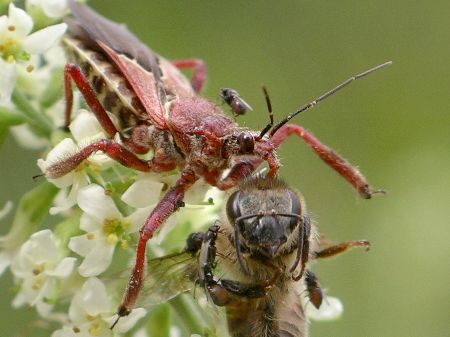by Valerie
November, 2015Bee Assassin
Predatory insects are generally considered to be beneficial because they help to control herbivorous pests in the garden. But are they still desirable when they eat pollinators? That's exactly what the aptly named bee assassin (Apiomerus spissipes) often does. It also feasts on caterpillars, ants, plant bugs and beetles, but I most often find this species with a bee in its grasp. And honey bees, like the one in the above image, seem to be the preferred prey. One benefit that the imported honey bee provides is to take some of the predatory pressure off of our native bees, at least in respect to this one particular enemy. The tiny flies in attendance are scavengers called "freeloader flies" (family milichiidae). They have an uncanny knack for finding larger predaceous insects and spiders with prey, from which they help themselves to an easy meal. Like almost all true bugs, the bee assassin consumes a completely liquid diet, using its proboscis to suck the fluids out of its victims. Because this method of eating takes more time than chewing would, there is a greater chance of finding assassin bugs with prey and being able to photograph the event than is the case with mantises or dragonflies. |